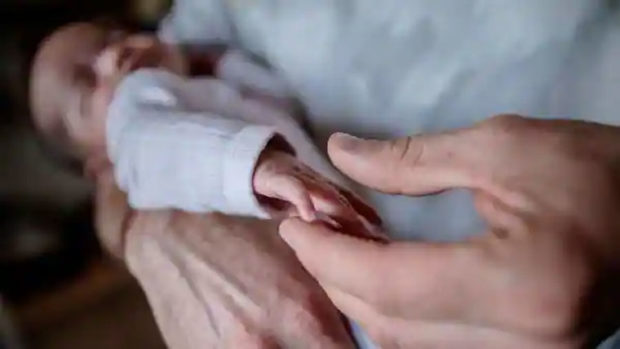
COVID-19: Study finds mother-to-baby infection rate low, indirect risk exists
Team Udayavani, Apr 24, 2021, 10:19 AM IST

Houston: Although mother-to-newborn transmission of coronavirus is rare, newborns of expectant mothers with COVID-19 can still suffer indirect adverse health risks as a result of worsening maternal illness due to the disease, a study says.
Beth Israel Deaconess Medical Center (BIDMC), Brigham, Women’s Hospital, Boston Children’s Hospital and Massachusetts General Hospital reveal that “ours is the first study to dive into the risk factors for mother-to-newborn SARS-CoV-2 transmission.”
“We expected the mode of delivery and/or the degree of maternal illness to increase the risk of newborn infection, but were surprised to find that this was not the case.”
Examining neonatal outcomes during the first month of life for babies born at 11 hospitals that represent approximately 50 percent of all births in Massachusetts, the team identified 255 neonates delivered between March 1-July 31, 2020, to mothers with a recent positive SARS-CoV-2 test result. The researchers used the American Academy of Pediatrics’ National Registry for Surveillance and Epidemiology of Perinatal COVID-19 Infection complemented by a Massachusetts-specific Registry.
Out of the 255 neonates studied, 88.2 percent were tested for SARS-CoV-2, and only 2.2 percent had positive results, as per the study. However, while infection rates among newborns were relatively low, worsening maternal illness accounted for 73.9 percent of preterm births. Premature birth can often lead to acute and chronic complications, including respiratory distress, chronic health problems and developmental disabilities.
“We found that of babies born to mothers with COVID-19, very few babies tested positive,” said senior author Mandy Brown Belfort, MD, MPH, Director of Clinical Research in the Department of Pediatric Newborn Medicine at Brigham and Women’s Hospital and Associate Professor of Pediatrics at Harvard Medical School.
“Instead, the adverse health impact of maternal COVID-19 on the newborn was from preterm delivery, usually prompted by a mother’s worsening illness. Our findings support the need for thoughtful and collaborative decision-making around delivery timing in the setting of maternal COVID-19 illness.”
Other indicators of adverse infant health outcomes the researchers incorporated in their analysis included low birth weight or very low birth weight, need for delivery room resuscitation, length of hospital stay and healthcare utilisation for non-routine visits within a month after discharge, the study said.
“This observation that newborns of socially vulnerable mothers were five times more likely to have COVID-19 highlights that health disparities are very complex and extend beyond race, ethnicity and language status,” said Asmenia Angelidou, instructor in pediatrics at Harvard Medical School.
“Social vulnerability likely affects health and immunity and our study supports further research in this area. Reallocation of resources to socially vulnerable communities could go a long way in decreasing human suffering and economic loss during disease outbreaks.”
The authors suggest further research on perinatal viral transmission should include women with COVID-19 early in pregnancy in order to identify the window of highest susceptibility to the virus for mother and baby during pregnancy. Conversely, future research including pregnant women immunised against COVID-19 is important to inform the optimal window for maximal neonatal protection after maternal immunization, they said.
“While the low rates of neonatal infection we observed are reassuring, it is important that providers remain vigilant,” Angelidou said.
“Even during public health emergencies like the ongoing pandemic, providers need to carefully monitor newborns for atypical signs of the illness, while also trying to avoid unnecessary premature deliveries that pose inherent risks for both mother and child,” she said.
Udayavani is now on Telegram. Click here to join our channel and stay updated with the latest news.
Top News

Related Articles More

New Year’s greetings with an artificial but intelligent twist

Space docking experiment: Spacecraft injected into right orbit, ISRO eyes another tech feat

GSLV mission planned in January would be 100th launch from Sriharikota: ISRO chief

From Karnataka to Orbit: Adichunchanagiri SJCIT, RVCE, & Bellatrix Launch Payloads on ISRO’s SpaDEx
ISRO to demonstrate docking of satellites in space in January, launch on Monday
MUST WATCH
Latest Additions

If you play good cricket, you don’t need PR: MS Dhoni

No one can ever stop Taiwan’s reunification with China, says President Xi in his New Year message

Honnavar: Tragic road accident claims three young lives

Mangaluru: Concern over relocation of Srinivas Mallya statue for NH widening

Udupi: Handloom saree exhibition and sale at Rajangana from January 1 to 15
Thanks for visiting Udayavani
You seem to have an Ad Blocker on.
To continue reading, please turn it off or whitelist Udayavani.




















